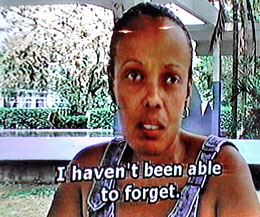- Cuban Security Agent Discloses Posada Carriles Terrorist Plans (Prensa Latina, 06-06-2005)
- Cuban terrorist seeking U.S. asylum was on CIA payroll (FCN, 05-24-2005)
- Has the ‘war on terrorism’ ended? (FCN Perspectives, 05-17-2005)

WASHINGTON (FinalCall.com) -“I am here to say that this is not a faceless crime and this guy deserves to be tried in Venezuela for his crimes,” Trevor Persaud told reporters recently. He is brother of a victim who died at the hands of a terrorist bombing of a Cuban airliner on Oct. 6, 1976.
Substantial proof exists that Luis Posada Carriles–now in custody in this country on immigration charges for entering the U.S. illegally–was involved in the planning and execution of the destruction of that flight Cubana Airlines flight 455, which killed 73 people.
“I haven’t been able to forget,” another family member said in video testimony, produced by film maker Gloria La Riva in Cuba. The video testimony and demands that Mr. Posada Carriles be extradited to Venezuela were made to reporters May 13, at the National Press Club.
Because of U.S. restrictions on travel to this country from Cuba, Ms. La Riva took the testimony May 2-3 from families of the airliner’s captain, crew and members of a fencing team.
“My mother is still grieving about what happened some 29 years ago,” shared Kenrick Persaud, another of Raymond Persaud’s surviving brothers. “My father, who passed away two years ago, was obsessed with the bombing. He collected clippings and whatever information he could collect. He was going to write a book, in conjunction with the World Trade Center bombing, before he passed away,” he continued. Raymond was a 19-year-old on his way from Guyana to Cuba to study medicine, when the flight was destroyed.
“My brother Fabio was killed in Cuba by a bomb explosion at a hotel installation in Havana, one of many in the summer of 1997 which caused one death (Fabio) and 11 wounded,” Livio Di Celmo, now a Canadian citizen, wrote in a letter released at the May 13 press conference held by the International ANSWER Coalition.
“As relatives of terrorism victims very well know, one of the first things that we do after we experience the loss of a dear one by such an act is to try and understand who, what, why is behind this kind of evil,” Mr. Di Celmo continued. “I was soon to discover that Cuba has, since 1959, suffered more than 3,400 innocent civilian deaths and more than 2,000 wounded by terrorist acts (including biological), originating from the anti-Cuban, extreme-right, terrorist groups thriving in Florida,” the letter continued.
Mr. Posada Carriles is currently wanted in Venezuela, where he escaped from jail, while awaiting an appeal in his trial for murdering the 73 people killed on Flight 455. Ironically, he “proudly admitted that he organized a series of bombings at Havana hotels, restaurants and discotheques in 1997,” according to transcripts from an interview with The New York Times.
“While the U.S. is fighting terrorism abroad, we should not be harboring terrorists at home,” Rep. McDermott continued. “I trust that our government will not grant an admitted terrorist like Mr. Posada asylum, when we have not even afforded counsel to hundreds of detainees we are holding at Guantanamo.”
President George Bush has made a point of his unwavering moral stand on the issue of harboring terrorists, pointed out Wayne Smith, former chief of the U.S. Interests Section in Havana (1979-1982), and now a Senior Fellow at the Center for International Policy.
But the personal involvement of the Bush family with Mr. Posada Carriles and with an associate, Orlando Bosch, could be making it more difficult for the President to make the decision to extradite Mr. Posada, the decision which would be morally consistent with U.S. policy.
“Jeb Bush, who was working at that point on the re-election campaign of Ileana Ros-Lehtinen (R-Fl.), was one of the leaders of the campaign to allow Orlando Bosch to remain in the United States, to pardon him and to allow him to remain here. So George H.W. Bush, then the president, goes along, and they approve the pardon and allow him to remain.
“The Justice Department has said: ‘If we allow him to remain, we will have no credibility with other nations in urging them not to harbor terrorists.’ But we did harbor Orlando Bosch, and he has been living in Miami, a free man, and never expressed any regret for the bombing. On the contrary, he continues to say: ‘There were no innocent people on that plane,’ ” Mr. Smith argued. “He has never renounced terrorism, never expressed any regret for anything he has done.”
Mr. Posada Carriles, a long-time CIA operative, whose ties go back to the mid-1960s, is actually mentioned in an Oct. 1976 FBI cable, released by International ANSWER, as one of the “persons suspected of involvement” in the Oct. 1976 crash off the coast of Barbados with whom the CIA “had a relationship.”
Indeed, criticism of the U.S. in the matter of extraditing Mr. Posada, according to the U.S. extradition treaty with Venezuela, has been across the board. “Washington would offend American principles and set an extremely damaging precedent by making a special exception for an admitted terrorist,” The New York Times wrote in an editorial May 10.












